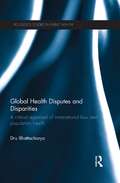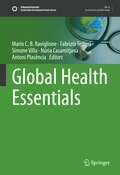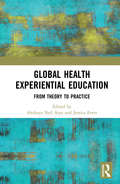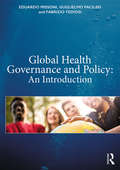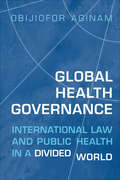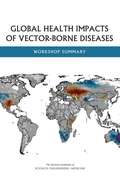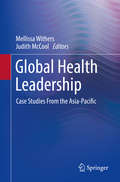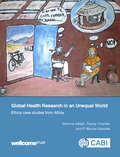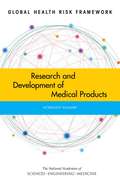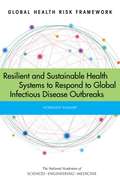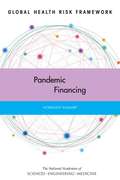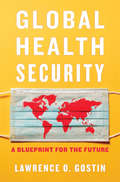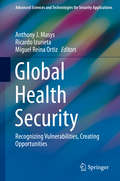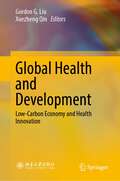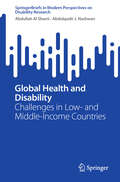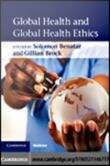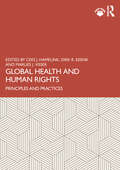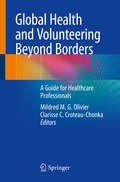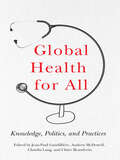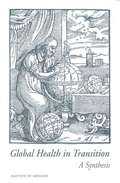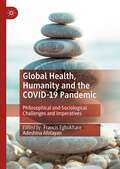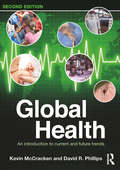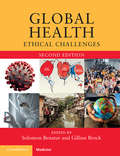- Table View
- List View
Global Health Disputes and Disparities: A Critical Appraisal of International Law and Population Health
by Dru BhattacharyaGlobal Health Disputes and Disparities explores inequalities in health around the world, looking particularly at the opportunity for, and limitations of, international law to promote population health by examining its intersection with human rights, trade, and epidemiology, and the controversial issues of legal process, religion, access to care, and the social context of illness. Using a theoretical framework rooted in international law, this volume draws on a wide range of rich empirical data to assess the challenges facing the field, including international legal treaty interpretation, and specific issues related to the application of law in resolving pressing issues in gender, access to care, and social determinants of health. In doing so, it illustrates the challenges for implementing rights-based approaches to address health disparities, with profound implications for future regulations and policymaking. It includes both interviews with leading scholars, as well as a variety of case studies from prominent international forums, including formal claims brought before the Human Rights Council and the Committee on the Elimination of All Forms of Discrimination Against Women, as well as regional and national experiences, drawn from disputes in India, Indonesia, South Africa and the USA. This volume is an innovative contribution to the burgeoning fields of global health and human rights, and will be of interest to students and researchers in public health, global health, law and sociology interested in the social determinants of health and social justice from both theoretical and practical perspectives.
Global Health Essentials (Sustainable Development Goals Series)
by Fabrizio Tediosi Mario C. B. Raviglione Simone Villa Núria Casamitjana Antoni PlasènciaThis practical and handy textbook offers a succinct yet comprehensive overview of the main challenges, issues and solutions in global health in relation to the UN’s Sustainable Development Goals (SDG) 2030 agenda. Subdivided into 11 parts, devoted each to a macro-topic, the book opens with an introduction to Global Health followed by an overview of the global burden of disease – from child and maternal health to communicable and non-communicable diseases. The authors further examine the social determinants of health, health systems’ features as well as innovations, governance and methods in Global Health. In consideration of the emerging discussions and ideas, and beyond the more traditional and essential elements of global health, the book also looks at the need to re-think the whole concept of global health and the importance of a “decolonized” approach that engages low and lower-middle countries fully. One entire part is then devoted to analyzing the major threats to the health of humanity such as climate change, the need for an ecological approach to health (including “One Health” approaches), and, ultimately, planetary health. Written by an international panel of more than 100 experts, this manual will be an excellent resource for students in a broad range of disciplines – from medicine and other scientific studies to economics, social science, anthropology and international relations. Pragmatic and reader-friendly, it will further be a valuable tool for policymakers, program implementers and those wishing to build knowledge on the meaning, principles and practices of global health.
Global Health Experiential Education: From Theory to Practice
by Akshaya Neil Arya Jessica EvertThis book presents best practices for ethical and safe international health elective experiences for trainees and the educational competencies and evaluation techniques that make them valuable. It includes commentaries, discussions and descriptions of new global health education guidelines, reviews of the literature, as well as research. Uniquely, it will include ground-breaking research on perspectives of partners in the Global South whose voices are often unheard, student perspectives and critical discussions of the historical foundations and power dynamics inherent in international medical work. Global Health Experiential Education is a timely book that will be of interest to academic directors of global health programmes and anyone involved in training and international exchanges across North America.
Global Health Governance and Policy: An Introduction
by Eduardo Missoni Guglielmo Pacileo Fabrizio TediosiGlobal Health Governance and Policy outlines the fundamentals of global health, a key element of sustainable development. Taking an interdisciplinary approach, it explores the relationship between the globalization process and global health’s social, political, economic and environmental determinants. It points the attention to the actors and forces that shape global policies and actions with an impact on peoples’ health in an increasingly complex global governance context. Topics discussed include: The relationship between globalization and the determinants of health The essentials of global health measurements The evolution of public health strategies in the context of the global development agenda The actors and influencers of global health governance The role of health systems The dynamics and mechanisms of global health financing and Development Assistance for Health Career opportunities in global health governance, management and policy Looking in depth at some of the more significant links between neoliberal globalization, global policies and health, Global Health Governance and Policy: An Introduction discusses some specific health issues of global relevance such as changes in the ecosystem, epidemics and the spread of infectious diseases, the global transformation of the food system, the tobacco epidemic, human migration, macroeconomic processes and global financial crisis, trade and access to health services, drugs and vaccines, and eHealth and the global "health 4.0" challenge. Written by a team of experienced practitioners, scientists and teachers, this textbook is ideal for students of all levels and professionals in a variety of disciplines with an interest in global health.
Global Health Governance: International Law and Public Health in a Divided World
by Obijiofor AginamGlobalization has immersed all of humanity in a single germ pool. There are no health sanctuaries in a globalizing world. In Global Health Governance, Obijiofor Aginam explores the relevance of international law in contemporary public health diplomacy. He focuses on the concept of mutual vulnerability to explore the globalization of disease, in what is paradoxically a global village and a divided world. Drawing from a wide range of disciplines, Global Health Governance offers a holistic approach to global health governance involving a multiplicity of actors: nation-states, international organizations, civil society organizations, and private actors. Aginam articulates modest proposals under the rubric of communitarian globalism, a paradigm that strives to meet the ideals of 'law of humanity.' These proposals project a humane global health order where all of humanity is inexorably tied into a global compact and where the health of one nation-state rises and falls with the health of others. International law—with its bold claims to universal protection of human rights and human dignity—is an indispensable governance tool for the reconstruction of damaged public health trust in the relations of nations and peoples.
Global Health Impacts of Vector-Borne Diseases: Workshop Summary
by Engineering Medicine National Academies of SciencesPathogens transmitted among humans, animals, or plants by insects and arthropod vectors have been responsible for significant morbidity and mortality throughout recorded history. Such vector-borne diseases – including malaria, dengue, yellow fever, and plague – together accounted for more human disease and death in the 17th through early 20th centuries than all other causes combined. Over the past three decades, previously controlled vector-borne diseases have resurged or reemerged in new geographic locations, and several newly identified pathogens and vectors have triggered disease outbreaks in plants and animals, including humans. Domestic and international capabilities to detect, identify, and effectively respond to vector-borne diseases are limited. Few vaccines have been developed against vector-borne pathogens. At the same time, drug resistance has developed in vector-borne pathogens while their vectors are increasingly resistant to insecticide controls. Furthermore, the ranks of scientists trained to conduct research in key fields including medical entomology, vector ecology, and tropical medicine have dwindled, threatening prospects for addressing vector-borne diseases now and in the future. In June 2007, as these circumstances became alarmingly apparent, the Forum on Microbial Threats hosted a workshop to explore the dynamic relationships among host, pathogen(s), vector(s), and ecosystems that characterize vector-borne diseases. Revisiting this topic in September 2014, the Forum organized a workshop to examine trends and patterns in the incidence and prevalence of vector-borne diseases in an increasingly interconnected and ecologically disturbed world, as well as recent developments to meet these dynamic threats. Participants examined the emergence and global movement of vector-borne diseases, research priorities for understanding their biology and ecology, and global preparedness for and progress toward their prevention, control, and mitigation. This report summarizes the presentations and discussions from the workshop.
Global Health Leadership: Case Studies From the Asia-Pacific
by Mellissa Withers Judith McCoolThis timely book serves as an overview of the challenges in global health leadership from multiple perspectives, bringing together an interdisciplinary group of academics, researchers, and leaders from around the world who are conducting innovative and high-quality research in the field of global health (GH). The book helps illustrate theoretical and conceptual ideas of leadership using recent examples of GH challenges from the Asia-Pacific region.Leadership is an important element of education and training in GH. Leadership can be demonstrated by many sectors, including local and national government, intergovernmental and non-governmental organizations, multilateral organizations, civil society, and private individuals and corporations. The cases included in this book provide an analysis of the major components to successful efforts in GH, including cooperation, cultural competency, vision, and community ownership.Given that GH practice is typically conducted in team settings with members from various backgrounds, this book provides students, faculty, and professionals in public health and related fields with an opportunity to examine multiple examples of leadership in different contexts. Readers learn how leaders have overcome challenges faced in the operationalization of complex health interventions, foreign policy, and working with key stakeholders and organizations.This book aims to help students to:Identify key trends and issues working in GH contexts;Analyze situations in GH and explain the ways public health, health care, and other organizations can work together or individually to affect the health of a community;Recognize the ways that diversity influences policies, programs, services, and the health of a community;Support diverse perspectives in developing, implementing, and evaluating policies, programs, and services that affect the health of a community;Identify characteristics of GH leaders;Learn about ways to identify and measure success in leadership; andUnderstand the challenges and barriers faced in GH programs and how to overcome those.
Global Health Research in an Unequal World
by Gemma AellahThis book is a collection of fictionalized case studies of everyday ethical dilemmas and challenges, encountered in the process of conducting global health research in places where the effects of political and economic inequality are particularly evident. It is a training tool to fill the gap between research ethics guidelines and their implementation "on the ground. " The cases focus on "relational" ethics: ethical actions and ideas that continuously emerge through relations with others, rather than being determined by bioethics regulation. They are based on stories and experiences collected by a group of social anthropologists who have worked with leading transnational medical research organizations across Africa in the past decade. Accompanied by guidelines, discussion questions and selected further readings, the book provides a flexible resource for training and self-study for people engaged in health research with, universities, international collaborative sites and NGOs - and for everyone interested in the realities of global health research today.
Global Health Research in an Unequal World: Ethics Case Studies from Africa
by Gemma Aellah Tracey Chantler P. Wenzel GeisslerThis book is a collection of fictionalised case studies of everyday ethical dilemmas and challenges, encountered in the process of conducting global health research in places where the effects of global, political and economic inequality are particularly evident.
Global Health Risk Framework: Workshop Summary
by Engineering Medicine National Academies of SciencesSince the 2014 Ebola outbreak many public- and private-sector leaders have seen a need for improved management of global public health emergencies. The effects of the Ebola epidemic go well beyond the three hardest-hit countries and beyond the health sector. Education, child protection, commerce, transportation, and human rights have all suffered. The consequences and lethality of Ebola have increased interest in coordinated global response to infectious threats, many of which could disrupt global health and commerce far more than the recent outbreak. In order to explore the potential for improving international management and response to outbreaks the National Academy of Medicine agreed to manage an international, independent, evidence-based, authoritative, multistakeholder expert commission. As part of this effort, the Institute of Medicine convened four workshops in summer of 2015 to inform the commission report. The presentations and discussions from the Workshop on Research and Development of Medical Products are summarized in this report.
Global Health Risk Framework: Workshop Summary
by Engineering Medicine National Academies of SciencesSince the 2014 Ebola outbreak many public- and private-sector leaders have seen a need for improved management of global public health emergencies. The effects of the Ebola epidemic go well beyond the three hardest-hit countries and beyond the health sector. Education, child protection, commerce, transportation, and human rights have all suffered. The consequences and lethality of Ebola have increased interest in coordinated global response to infectious threats, many of which could disrupt global health and commerce far more than the recent outbreak. In order to explore the potential for improving international management and response to outbreaks the National Academy of Medicine agreed to manage an international, independent, evidence-based, authoritative, multistakeholder expert commission. As part of this effort, the Institute of Medicine convened four workshops in summer of 2015 to inform the commission report. The presentations and discussions from the Workshop on Resilient and Sustainable Health Systems to Respond to Global Infectious Disease Outbreaks are summarized in this report.
Global Health Risk Framework: Workshop Summary
by Engineering Medicine National Academies of SciencesSince the 2014 Ebola outbreak many public- and private-sector leaders have seen a need for improved management of global public health emergencies. The effects of the Ebola epidemic go well beyond the three hardest-hit countries and beyond the health sector. Education, child protection, commerce, transportation, and human rights have all suffered. The consequences and lethality of Ebola have increased interest in coordinated global response to infectious threats, many of which could disrupt global health and commerce far more than the recent outbreak. In order to explore the potential for improving international management and response to outbreaks the National Academy of Medicine agreed to manage an international, independent, evidence-based, authoritative, multistakeholder expert commission. As part of this effort, the Institute of Medicine convened four workshops in summer of 2015 to inform the commission report. The presentations and discussions from the Pandemic Financing Workshop are summarized in this report.
Global Health Security: A Blueprint for the Future
by Lawrence O. GostinWith lessons learned from COVID-19, a world-leading expert on pandemic preparedness proposes a pragmatic plan urgently needed for the future of global health security. The COVID-19 pandemic revealed how unprepared the world was for such an event, as even the most sophisticated public health systems failed to cope. We must have far more investment and preparation, along with better detection, warning, and coordination within and across national boundaries. In an age of global pandemics, no country can achieve public health on its own. Health security planning is paramount. Lawrence O. Gostin has spent three decades designing resilient health systems and governance that take account of our interconnected world, as a close advisor to the Centers for Disease Control and Prevention (CDC), the World Health Organization (WHO), and many public health agencies globally. Global Health Security addresses the borderless dangers societies now face, including infectious diseases and bioterrorism, and examines the political, environmental, and socioeconomic factors exacerbating these threats. Weak governance, ineffective health systems, and lack of preparedness are key sources of risk, and all of them came to the fore during the COVID-19 crisis, even—sometimes especially—in wealthy countries like the United States. But the solution is not just to improve national health policy, which can only react after the threat is realized at home. Gostin further proposes robust international institutions, tools for effective cross-border risk communication and action, and research programs targeting the global dimension of public health. Creating these systems will require not only sustained financial investment but also shared values of cooperation, collective responsibility, and equity. Gostin has witnessed the triumph of these values in national and international forums and has a clear plan to tackle the challenges ahead. Global Health Security therefore offers pragmatic solutions that address the failures of the recent past, while looking toward what we know is coming. Nothing could be more important to the future health of nations.
Global Health Security: Recognizing Vulnerabilities, Creating Opportunities (Advanced Sciences and Technologies for Security Applications)
by Anthony J. Masys Ricardo Izurieta Miguel Reina OrtizWith our highly connected and interdependent world, the growing threat of infectious diseases and public health crisis has shed light on the requirement for global efforts to manage and combat highly pathogenic infectious diseases and other public health crisis on an unprecedented level. Such disease threats transcend borders. Reducing global threats posed by infectious disease outbreaks – whether naturally caused or resulting from a deliberate or accidental release – requires efforts that cross the disaster management pillars: mitigation, preparedness, response and recovery. This book addresses the issues of global health security along 4 themes: Emerging Threats; Mitigation, Preparedness, Response and Recovery; Exploring the Technology Landscape for Solutions; Leadership and Partnership. The authors of this volume highlight many of the challenges that confront our global security environment today. These range from politically induced disasters, to food insecurity, to zoonosis and terrorism. More optimistically, the authors also present some advances in technology that can help us combat these threats. Understanding the challenges that confront us and the tools we have to overcome them will allow us to face our future with confidence.
Global Health and Development: Low-Carbon Economy and Health Innovation
by Gordon G. Liu Xuezheng QinThis book reviews the global preparedness to pandemic challenges to human health and development by compiling the brilliant ideas of experts and entrepreneurs from the fields of public health, health economics, environmental engineering, pharmaceutical interventions, and other related fields.This book proposes a collective effort to take pandemic prevention, preparedness, and response seriously and prioritize it accordingly to avoid the potential catastrophe in this inter-connected world by summarizing the lessons learned from the COVID-19. In the context of today’s climate change and its association with human health, the book presents the need for aligning climate and health goals and puts up with the multi-sectors and low-carbon economic strategies where health is prioritized in development.Furthermore, when more and more novel medical and pharmaceutical items worldwide are launched, the health system could be improved. With the help of digital health, artificial intelligence (AI), and other innovative forms of healthcare products, the efficiency and effectiveness of healthcare services provision could be promoted, leading to a more promising future for human health.This book vividly presents how such new technologies are applied to build an intelligent and robust health system and how innovations can be used to promote human health.
Global Health and Disability: Challenges in Low- and Middle-Income Countries (SpringerBriefs in Modern Perspectives on Disability Research)
by Abdullah Al Shami Abdulqadir J. NashwanThis book aims to shed light on the pressing and often overlooked challenges faced by individuals with disabilities in low- and middle-income countries (LMICs). The book explores how structural barriers, limited resources, and socio-cultural factors contribute to the inequities in access to essential services such as health care, education, and employment for this vulnerable population. Through a detailed analysis, the book highlights the disparities that exist between high-income countries and LMICs, offering insights into the unique obstacles that individuals with disabilities encounter in these regions. This book is of particular importance to the field currently due to the growing recognition of disability as a critical aspect of global health and development. The recent focus on inclusivity in global agendas, such as the Sustainable Development Goals (SDGs), underscores the need for a comprehensive understanding of how disability intersects with poverty, inequality, and access to essential services.
Global Health and Global Health Ethics
by Solomon Benatar Gillian BrockWhat can be done about the poor state of global health? How are global health challenges intimately linked to the global political economy and to issues of social justice? What are our responsibilities and how can we improve global health? Global Health and Global Health Ethics addresses these questions from the perspective of a range of disciplines, including medicine, philosophy and the social sciences. Topics covered range from infectious diseases, climate change and the environment to trade, foreign aid, food security and biotechnology. Each chapter identifies the ways in which we exacerbate poor global health and discusses what we should do to remedy the factors identified. Together, they contribute to a deeper understanding of the challenges we face, and propose new national and global policies. Offering a wealth of empirical data and both practical and theoretical guidance, this is a key resource for bioethicists, public health practitioners and philosophers.
Global Health and Human Rights: Principles and Practices
by Cees J. Hamelink Dirk R. Essink Marlies J. VisserThis textbook explores public health and individual health care through the prism of global human rights and ethical decision-making.Written by leading experts in this field, the book is divided into three distinctive parts. Part I introduces the theoretical framework through which the core issues can be understood, contrasting a clinical approach to health care with a social determinant perspective and discussing the decolonialisation of global health. Part II discusses how a human rights rationale impacts different social groups, from children to the elderly to those with disabilities, highlighting issues such as abortion and euthanasia. Part III addresses contemporary topics such as infectious diseases, migration, mental health care, the impact of advanced medical technology and climate change. Each chapter features case studies which ask readers to assess complex ethical dilemmas, fostering decision-making based on clear moral reasoning, as well as discussion assignments and further reading.Also featuring online video lectures, this is an important textbook that will be essential reading for students across the health sciences, including medicine and all related fields.
Global Health and Volunteering Beyond Borders: A Guide for Healthcare Professionals
by Mildred M. G. Olivier Clarisse C. Croteau-ChonkaGlobal Health and Volunteering: A Guide for Healthcare Professionals is designed to educate volunteers to be effective partners in delivering medical services locally and globally. Healthcare professionals are increasingly interested in global health and volunteering in areas of acute need. The biggest challenge to health in many locales is the inability to access the health care system. When people do connect with medical services, medications and surgical opportunities for chronic disease (i.e. glaucoma, diabetes, or hypertension) are often not affordable or cannot be sustained for a long period of time. The contributions in this book focus on a respectful dialog with local people and a willingness to learn from new experiences on the part of the volunteer. Skills transfer from visiting personnel to local providers is featured as a means to enhance healthcare sustainability. An appreciation of differing cultures, an understanding of the local economic conditions and challenges, and strategies for collaborating with the existing medical establishment are foundations of successful volunteer experiences as highlighted in this book. Dimensions of global health such as professionalism, religious beliefs, ethical dilemmas, traditional medicine, and alternative strategies for service are addressed by experts. Written and edited by leaders in the field, many of whom have more than two decades of experience volunteering abroad, Global Health and Volunteering: A Guide for Healthcare Professionals imparts lessons learned to help the reader avoid initial mistakes, while making the global health commitment stronger.
Global Health for All: Knowledge, Politics, and Practices
by Jean-Paul Gaudillière Christoph Gradmann Claudia Lang Laurent Pordié Claire Beaudevin Anne M. Lovell Andrew McDowell Olivia Fiorilli Lucile Ruault Caroline Meier Biesen Jessica Pourraz Vegard Traavik Sture Mandy Geise Sameea Ahmed Hassim Fanny Chabrol Simeng WangGlobal Health for All trains a critical lens on global health to share the stories that global health’s practices and logics tell about 20th and 21st century configurations of science and power. An ethnography on multiple scales, the book focuses on global health’s key epistemic and therapeutic practices like localization, measurement, triage, markets, technology, care, and regulation. Its roving approach traverses policy centers, sites of intervention, and innumerable spaces in between to consider what happens when globalized logics, circulations, and actors work to imagine, modify, and manage health. By resting in these in-between places, Global Health for All simultaneously examines global health as a coherent system and as a dynamic, unpredictable collection of modular parts.
Global Health in Transition: Perspectives from International Organizations
by John H. BryantInformation on the Transition in Global Health
Global Health, Human Rights, and the Challenge of Neoliberal Policies
by Chapman Audrey R.Written by a respected authority on human rights and public health, this book delivers an in-depth review of the challenges of neoliberal models and policies for realizing the right to health. The author expertly explores the integration of social determinants into the right to health along with the methodologies and findings of social medicine and epidemiology. The author goes on to challenge the way that health care is currently provided and makes the case that achieving universal health coverage will require fundamental health systems reforms.
Global Health, Humanity and the COVID-19 Pandemic: Philosophical and Sociological Challenges and Imperatives
by Adeshina Afolayan Francis EgbokhareThis volume interrogates global health and especially the scourge of the COVID-19 pandemic, and the role that science has played in mitigating the human experiences of pandemics and health over the centuries. Science, and the scientific method, has always been at the forefront of the human attempt at undermining the virulent consequences of sicknesses and diseases. However, the scientific image of humans in the world is founded on the presumption of possessing the complete understanding about humans and their physiological and psychological frameworks. This volume challenges this scientific assumption. Global health denotes the complex and cumulative health profile of humanity that involves not only the framework of scientific researches and practices that investigates and seeks to improve the health of all people on the globe, but also the range of humanistic issues - economic, cultural, social, ideological - that constitute the sources of inequities and threat to the achievement of a positive global health profile. This volume balances the argument that diseases and pandemics are human problems that demand both scientific and humanistic interventions.
Global Health: An Introduction to Current and Future Trends
by David R. Phillips Kevin MccrackenGlobal Health continues to provide readers with a comprehensive, up-to-date and thought-provoking outline and understanding of the constantly evolving global health landscape. In this new edition the authors have maintained the successful structure and organisation of the previous edition to examine and explain recent health changes and consider likely future patterns. New or expanded topics covered include: emerging and re-emerging infectious disease threats increasing awareness of, and interest in, antimicrobial resistance and superbugs terrorism, global conflict and health the new UN 2030 Agenda for Sustainable Development the drive for Universal Health Coverage (UHC) the use of information technology in global health substance abuse palliative and end-of-life-care ethical issues in global health. Using clear and original explanations of complex issues, this text makes extensive use of boxed case studies and international examples, with discussion questions posed for readers at the end of each chapter. Readers will also be able to take advantage of the new website that was designed to complement this book. Global Health is essential reading for students and researchers of global health, public health and development studies.
Global Health: Ethical Challenges
by Gillian Brock Soloman BenatarAddressing global health is one of the largest challenges facing humanity in the 21st century, however, this task is becoming even more formidable with the accelerated destruction of the planet. Building on the success of the previous edition, the book outlines how progress towards improving global health relies on understanding its core social, economic, political, environmental and ideological aspects. A multi-disciplinary group of authors suggest not only theoretically compelling arguments for what we must do, but also provide practical recommendations as to how we can promote global health despite contemporary constraints. The importance of cross-cultural dialogue and utilisation of ethical tools in tackling global health problems is emphasised. Thoroughly updated, new or expanded topics include: mass displacement of people; novel threats, including new infectious diseases; global justice; and ecological ethics and planetary sustainability. Offering a diverse range of perspectives, this volume is essential for bioethicists, public health practitioners and philosophers.
